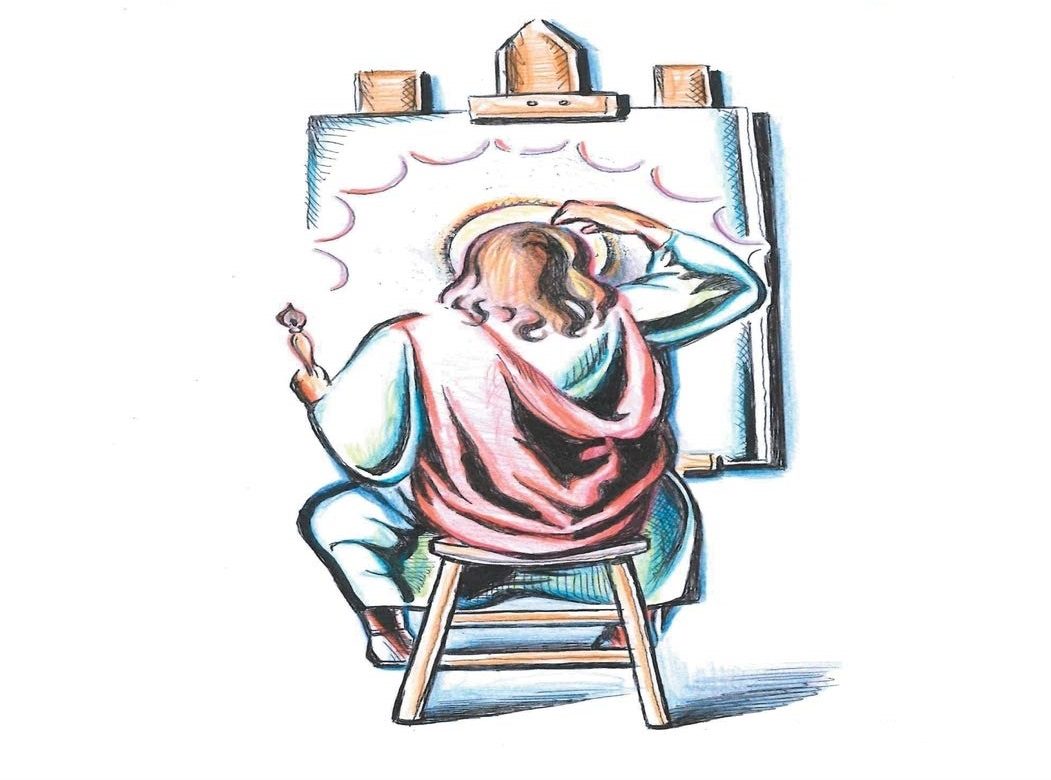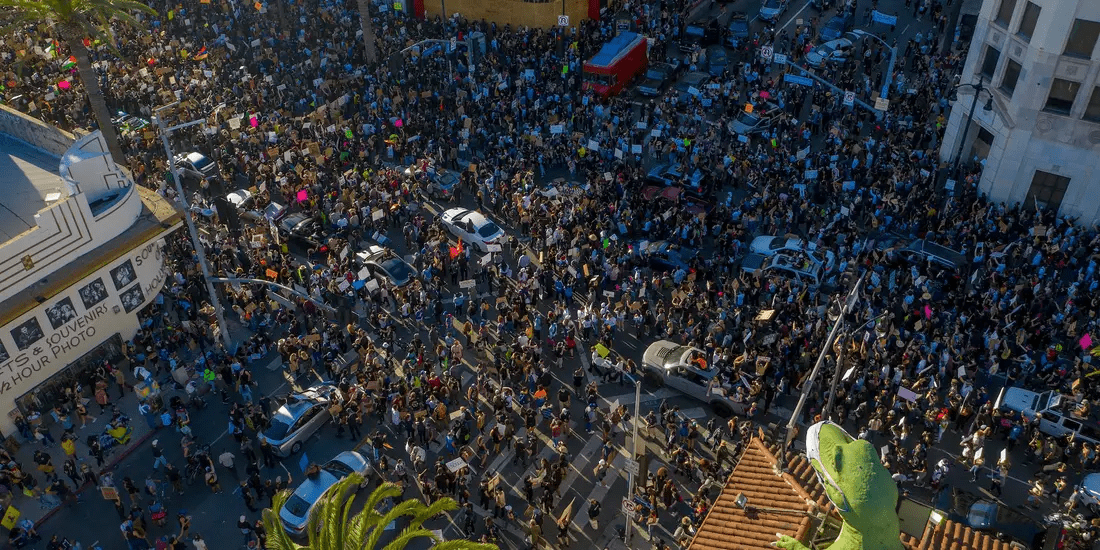Guest Post by Ben Larson
City Dionysus
Imagine an event so important, so universal that everyone in your city took a week off from work to attend. Everyone you know is either sitting in the stands with you, working backstage behind the scenes, or will be on the stage performing.
The City Dionysus was a religious festival that took place once a year in ancient Athens. The center of activity for the festival was the Odeon of Pericles, a 13,000 square foot amphitheatre near the southeastern corner of the Acropolis. Every year, the entire city spent a week producing, competing, performing, and watching plays at what we now view as the dawn of Western drama and theater.
There is no modern corollary for us. Imagine if we celebrated the Super Bowl the same way: all the stores were closed, and everyone in your town was at the stadium, playing, serving, or cheering their team on. For a week.
Contrast that with the way we think of theater and movies in our context. They’re something we go to for a date or diversion. If something more interesting comes up, we give our tickets away. If it’s a movie we don’t like, we walk out. If we get bored, we change the channel.
We aren’t directly connected to the artists, the creators, or the people in the audience with us, and the act of going to the movies isn’t a deeply religious part of our culture or lives. And maybe that’s a good thing?
But my point is this: for us, art is not something deeply connected to our daily lives. It’s a product we purchase and consume. It’s an accessory we use to enhance ordinary life. It’s this weird thing artists do that other people (sometimes) pay them for. It’s not something that is profoundly woven into everyone’s daily lives (or maybe that’s just our perception…but more on that later). And I think that’s why we have a hard time seeing it as connected to our faith.
The way I see it, there are three major ways that art can restore faith. Art can memorialize our faith and help us to remember it; art can be used to expound on truth and help us sharpen and define our faith; and – for artists especially – art itself can be an act of faith.
Faith in Memoriam
Faith is a combination of trust and obedience. Trust in the goodness of God, trust that following Christ is actually the best way for us to live, and obedience in actually following Him. But what about when we’re uncertain, suffering, doubting, and hurting? In Joshua 4, God instructs the Israelites to build a memorial out of twelve stones to serve as a reminder of His provision for them.
Art was used to memorialize the Israelites’ act of faith (crossing the Jordan) and God’s presence and provision. It can work the same way for us. What is the song you turn to when you’re hurting? What’s your ‘comfort food’ movie? What’s the picture on your desktop that transports you back into a dear memory?
We can’t always be certain about what’s going on in our lives or what God is asking of us, but in our moments of uncertainty, art can center us and remind us that hope, joy, love, and goodness still exist. Art can memorialize a moment where faith was rewarded, remind us of why our faith matters, or give us a sense that God is still there, even when it doesn’t feel like it.
The Spiritual Language
Art is also a powerful method of communicating truth, thereby shaping our faith. The Peanuts comic below was created by Charles M. Schulz, a Christian artist who spent nearly 50 years drawing the famous comic strip that most people recognize as the most influential work in the genre. He was a genius at using sarcasm, humor, and cartoons to express powerful ideas very simply.

We don’t need an explanation for the Peanuts cartoon. We don’t need someone to define and make distinctions between apathy, love, and compassion to understand what Schulz is saying. The message is clear, inarguable, and convicting.
Art is a universally human language that shortcuts past our words, pre-conceived ideas, and biases to confront us directly. I’ve heard my friends describe art as a language of the emotions, but I think that’s an incomplete definition. While the piece above does resonate at an emotional level, it’s also communicating something highly intellectual. Art is a spiritual language that can simultaneously communicate feeling, truth, and ideas.
Which is what makes it so mysterious. And cool.
Art = Faith?
Art can also be part of our walk of faith. In our Idol-saturated culture, artists often see pursuing art as a career choice, rather than a spiritual calling. Sometimes artists only see art as a gift God has given us to express our feelings, communicate our thoughts, and make a living. But that’s an anemic, self-centered way of seeing art.
God gives doctors the gift of healing primarily so they will heal others. The process of diagnosing, operating, prescribing, and healing may bring great personal satisfaction to a good doctor, but no one would say that the highest purpose of her gifts were for her personal expression or satisfaction.
God gives gifts because He intends His people to use them for the kingdom. We see this very clearly in both the New and Old Testaments:
“As each has received a gift, use it to serve one another, as good stewards of God’s varied grace: whoever speaks, as one who speaks oracles of God; whoever serves, as one who serves by the strength that God supplies—in order that in everything God may be glorified through Jesus Christ.” – I Peter 4:10 – 11
“Having gifts that differ according to the grace given to us, let us use them: if prophecy, in proportion to our faith; if service, in our serving; the one who teaches, in his teaching; the one who exhorts, in his exhortation; the one who contributes, in generosity; the one who leads, with zeal; the one who does acts of mercy, with cheerfulness.” – Romans 12:6 – 8
“[Moses said,] Let every skillful craftsman among you come and make all that the Lord has commanded; And every skillful woman spun with her hands, and they all brought what they had spun in blue and purple and scarlet yarns and fine twined linen. All the women whose hearts stirred them to use their skill spun the goats’ hair.” – Exodus 35:10, 25 & 26
Artistic gifts are no exception. While of course, God wants artists to experience joy while they create and communicate, His primary purpose in giving artistic gifts is for artists to use those gifts to enrich the lives of others.
We see this so clearly when someone with a normal voice becomes jealous of the gifted singer who always gets to sing solos. They shake their fist at God: “Why did You give that person those gifts instead of me?” The only way we could feel that way is if the real reason we desire gifts is to feed our own desires for fulfillment, satisfaction, and significance. The answer to the jealous question is pretty clear: because God wanted that person to use them.
What Would Jesus Draw?
If we have opinions about how we should use our gifts, we can bet that God does too. That brings up the question of the big art: what does God want from Christian artists? Books upon books have been written on the subject. Some people believe that Christian art should be recognizably distinct from all other art. Others think the only purpose for a Christian to make art is to evangelize. And still, others hate the very idea of Christian art or being labeled a Christian artist.
I suspect that – as usual – the truth lies somewhere in the middle of it all. But even if we can’t agree on the details of God’s plan for His artists, we can certainly agree that He does have opinions on what art we should make, how we should make it, and what it should be about.
One of my friends is an incredible wood sculptor, and when he became a Christian, he developed the habit of prayerfully approaching his art. For him, the artistic process is a way of listening to God and allowing God to lead him.
Giving up independence and control is difficult for any of us, and artists are no exception. We are steeped in a culture that tells us to be ourselves, do our thing, and find the way we’re special. But what if God is quietly calling us to something more humble, more others-focused, and more about Him than about us? To directly connecting our creating to our walk of faith? To following Him even in the way we make art?
For the Non-artist
The way we use art as non-artists is also important. Are we decorating our houses to show off our good taste, or to make our friends and family feel safe, welcome, and at home? Are we using movies and TV to create memories with our families and friends, or are we spending hours and hours alone bingeing on empty entertainment on Netflix?
Anytime we expose ourselves to art (whether we pay for it or not), we participate in it, for better or worse. Are we paying attention to the art we participate in and support? Are we watching movies and TV shows that are teaching us and challenging us, or are we simply reinforcing the consumerism and self-centeredness that our culture has taught us? Are we supporting our creative friends and local community of artists, or are we primarily driving the Hollywood machine and hanging prints of paintings by dead white guys?
The End
Whether we’re working artists, hobby artists, or simply art appreciators, we all participate in art all the time. We may not perceive a deep connection between art and our lives, but we are immersed in it constantly. Could we say “I like the English language, but it isn’t directly connected to my walk of faith”? Of course not! English is how I have learned and expressed every idea I have ever communicated, and it happens to be the language in which I read the Bible. We can’t divorce language from the shaping impact it has on our worldview.
My prayer is that we as we mature spiritually we are able to recognize and harness the powerful connection between art – this mysterious spiritual language – and our faith – our lifelong journey of obedience and trust.







